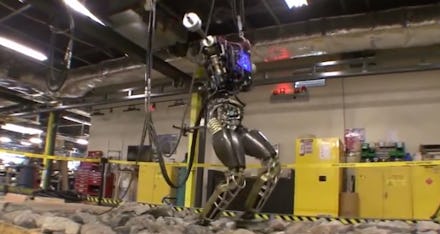Is Google Building An Android Army? They Just Bought Another Artificial Intelligence Company

Google wants to know what you need before you even realize that you need it.
This may explain why the company recently spent a reported $400 million to add yet another robotics company to its already growing collection.
The London-based, secretive artificial intelligence company DeepMind Technologies isn't a household name in the tech world and only has about a dozen employees, but they're extremely intelligent employees who spend all day "deep learning," a new area of AI that focuses on building robotics-like device and software that can recognize faces or words in human speech.
In short, DeepMind researchers are trying to build a human brain, which aligns perfectly with Google's mission of building computers that think like people in the not-so-distant future. Examples of Google heading in this direction shows in its recent products, such as the "smart" contact lenses that monitor glucose levels and Google Glass which works like a computer that you wear on your face.
In fact, Google already has a semi-secret lab called Google X where they train scientists to think of "science fiction-sounding solutions" with the intent of building products so futuristic, they sound like they come from a science-fiction novel.
Below, Googler Jeff Dean explains why Google is interested in "deep learning."
Since DeepMind is a relatively unknown, young company, Google's latest buy isn't about acquiring specific products, but rather minds, or talent. In an interview with MIT Technology Review before the DeepMind acquisition, Peter Norvig, a director of research at Google, said that his company "certainly [employed] more than 5%" of the world's leading experts in "deep learning."
As evidenced by the company's recent purchasing pattern, Google isn't slowing down its acquisition of companies to gain the best minds in the worlds. In the last half of 2013, Google bought eight robotics companies, which includes Boston Dynamics, a company known for developing animal-like robots and has close relations with the U.S. military.
Here's Boston Dynamic's very human-like robot designed to travel on rough terrain and capable of performing in "disaster areas."
And here's the Cheetah robot which runs around 29 miles per hour:
Why has Google acquired so many AI companies in such a short period of time? One reason is for amping up its "deep learning" projects and the second is to simply monopolize the most intelligent minds. In other words, if talent isn't working for your team, they're working for someone else's (Facebook reportedly tried to buy DeepMind in December 2012). It's what Facebook did with Instagram and tried to do with Snapchat.
So what's next for Google?
With the help of its growing "deep learning" staff, Google will continue to build products that mimics activity in our neurons, where the majority of thinking occurs. The futuristic technology will be able to recognize patterns of sound, images and other imperative data. This will help Google improve already-existing products, such as its self-driving car, but would also allow it to build robot-guidance products that predict situations before they happen, such as a technology that predicts medical problems or future traffic jams.
Basically, technology that comes out of the "deep learning" lab will help us understand and improve the world that we live in.
That's what Google is telling us anyway.